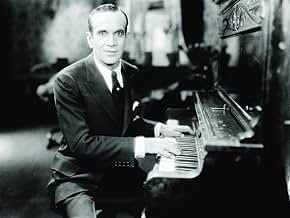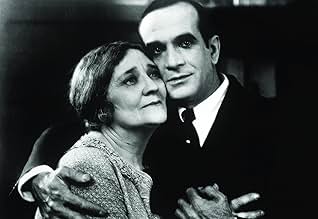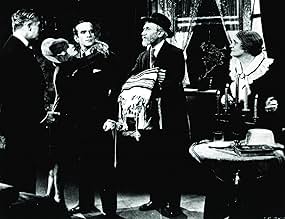The son of a Jewish Cantor must defy the traditions of his religious father in order to pursue his dream of becoming a jazz singer.The son of a Jewish Cantor must defy the traditions of his religious father in order to pursue his dream of becoming a jazz singer.The son of a Jewish Cantor must defy the traditions of his religious father in order to pursue his dream of becoming a jazz singer.
- Nominated for 1 Oscar
- 3 wins & 1 nomination total
- Jakie Rabinowitz - Age 13
- (as Bobby Gordon)
- Cantor Rosenblatt - Concert Recital
- (as Cantor Joseff Rosenblatt)
- Chorus Girl
- (uncredited)
- Chorus Girl
- (uncredited)
- Small Part
- (uncredited)
- Choreographer - 'April Follies'
- (uncredited)
- Small Part
- (uncredited)
- Violinist
- (uncredited)
- Small Part
- (uncredited)
- Buster Billings
- (uncredited)
- Dance Director
- (uncredited)
Featured reviews
The love interest here is so unusual. He does fall in love with a pretty dancer, but tells her plainly that his career is more important than she is. She later doesn't become part of the choice as would be the case in nearly every other script instead she becomes part of the audience, presenting the dramatic quandary: the stage or God.
The presentation of religion is unique in my experience. Everyone here is a Jew, except the performers. They are the "real" and everyone else is "pretend," performing. Though there are many opportunities to fall into obnoxious stereotypes, its avoided over and over. That's despite the dozens of examples they had before.
In fact, there's an amazing engineering of story here. As any viewer will know, this was the first talkie. It was new, and to emphasize its newness a story was created to emphasize the contrast between old and new.
This film is part silent, part "talkie." It shows a struggle between the old (obviously obsolete) and the vital young. It also depicts in a rather subtle but effective way the "old" god, and the new: there's plenty of talk about the performance hall being a modern church. The music as well: we have the implication that it is not only the setting, the performer and the calling, but the music itself that is something new.
Along the way we get street scenes of the Jewish area of New York. These are genuine street scenes and are absolutely phenomenal: there isn't anything I know that compares. There was an attempt of sorts in "The Pawnbroker," which by itself was strong. But nothing compared to this.
Ted's Evaluation -- 4 of 3: Every cineliterate person should experience this.
The movie is actually a hybrid, with some silent sequences and some sound sequences. Successful experiments with sound movies go back to the 1890s, and got closer and closer to the goal during the 1920s. "The Jazz Singer" was really just one of a number of steps on the way towards full-length all-talking pictures becoming commonplace, but it probably would not have caused such a sensation if it did not also have some good material to go along with the new technology. The sound quality and other technical aspects do reflect the limitations of the time, and some of the material does also reflect the perspectives of its era, and thus now seems odd or uncomfortable. But there is still a solid core of the story that is still worthwhile, in the conflict between Jack's talents and dreams on the one hand, and his family and heritage on the other.
In following Jack as he pursues his career and tries to make his family understand, the specific details of the situation and setting aren't really crucial to understanding his position. Anyone whose family or friends want them to do one thing, but who feels called in his or her heart to do something else, can easily identify with this kind of struggle. These themes are handled rather well, although some of the time the story is simply used as a device to set up the musical numbers. Most of these do not seem especially noteworthy now, at least in themselves, but they must have impressed the movie's original audiences.
The year 1927 produced an unusual number of great (silent) movies that have deservedly become highly-regarded classics. This version of "The Jazz Singer" doesn't stand up to those classics on its own merits, but in itself it is still as good as any other movie version of the story, and for anyone who enjoys either classic movies or movie history, it's definitely worth seeing.
But for trying to hold up the Brothers Warner for some extra salary for doing that first sound feature, Georgie Jessel might have been able to repeat the role he created on Broadway as Jakie Rabinowitz aka Jack Robin, cantor's son who runs away from home as a juvenile and comes back home in time to sing Kol Nidre at Yom Kippur services in place of his dying father. Jessel's greed was Al Jolson's gain as America's greatest live entertainer at the time got to inaugurate the era of movie sound.
As Al Jolson was wont to do in his stage shows, he interpolated material from all sources in his first film that he felt was suitable for him. Toot Toot Tootsie and interestingly enough My Mammy were songs he'd done on stage before and were proved material his audience would respond to. The first song he actually does sing is Dirty Hands, Dirty Face which was something he had not done before. Blue Skies which he sings to his mother after returning home as a Broadway star was in fact a current hit on Broadway at the time Jolson was singing it.
People from that era say that you cannot appreciate Jolson on the screen, that to really get the full impact of his dynamic stage presence you had to see him live. Maybe so, but since that isn't possible, there's enough of him in The Jazz Singer and other of his films to realize what a great entertainer he was, black-face or not.
Warner Oland, later to be the first Charlie Chan, plays Cantor Rabinowitz and Eugenie Besserer is touching as Jolson's mother caught hopelessly between her husband and son. In that first scene of a grownup Jolson in a café before he sings Dirty Hands, Dirty Face you will note that is William Demarest who he's dining with. Myrna Loy has a small role as a chorus girl.
Still both the play and the personality dictate that this film is owned exclusively by Al Jolson. Despite later versions with Danny Thomas and Neil Diamond in the lead, the story will always be identified with the man who said we ain't heard nothing yet.
Though The Jazz Singer is exponentially sentimental and mawkish, it does have a very nice depiction of Jewish life and neighborhood in the Teens and Twenties of the last century. And of course The Jazz Singer is a historic first.
Did you know
- TriviaThis is the first feature-length movie with audible dialogue.
- GoofsMary recieves a telegram dated August 8, 1927. Later in the film, Jack is seen writing a letter to Mary, dating it August 7, 1927.
- Quotes
[opening lines, first quote and first words in the first widely-seen talking picture]
Jack Robin: Wait a minute, wait a minute, you ain't heard nothin' yet! Wait a minute, I tell ya! You ain't heard nothin'! You wanna hear "Toot, Toot, Tootsie"? All right, hold on, hold on...
[then he walks back to one of the band members]
Jack Robin: Lou, listen. Play "Toot, Toot, Tootsie", three chorus, you understand. In the third chorus, I whistle. Now give it to 'em hard and heavy, go right ahead.
- ConnectionsEdited into Okay for Sound (1946)
- SoundtracksMy Gal Sal
(1905) (uncredited)
Written by Paul Dresser
Sung by Robert Gordon (dubbed by an unidentified singer)
Details
Box office
- Budget
- $422,000 (estimated)
- Runtime
- 1h 28m(88 min)
- Color
- Aspect ratio
- 1.33 : 1


































